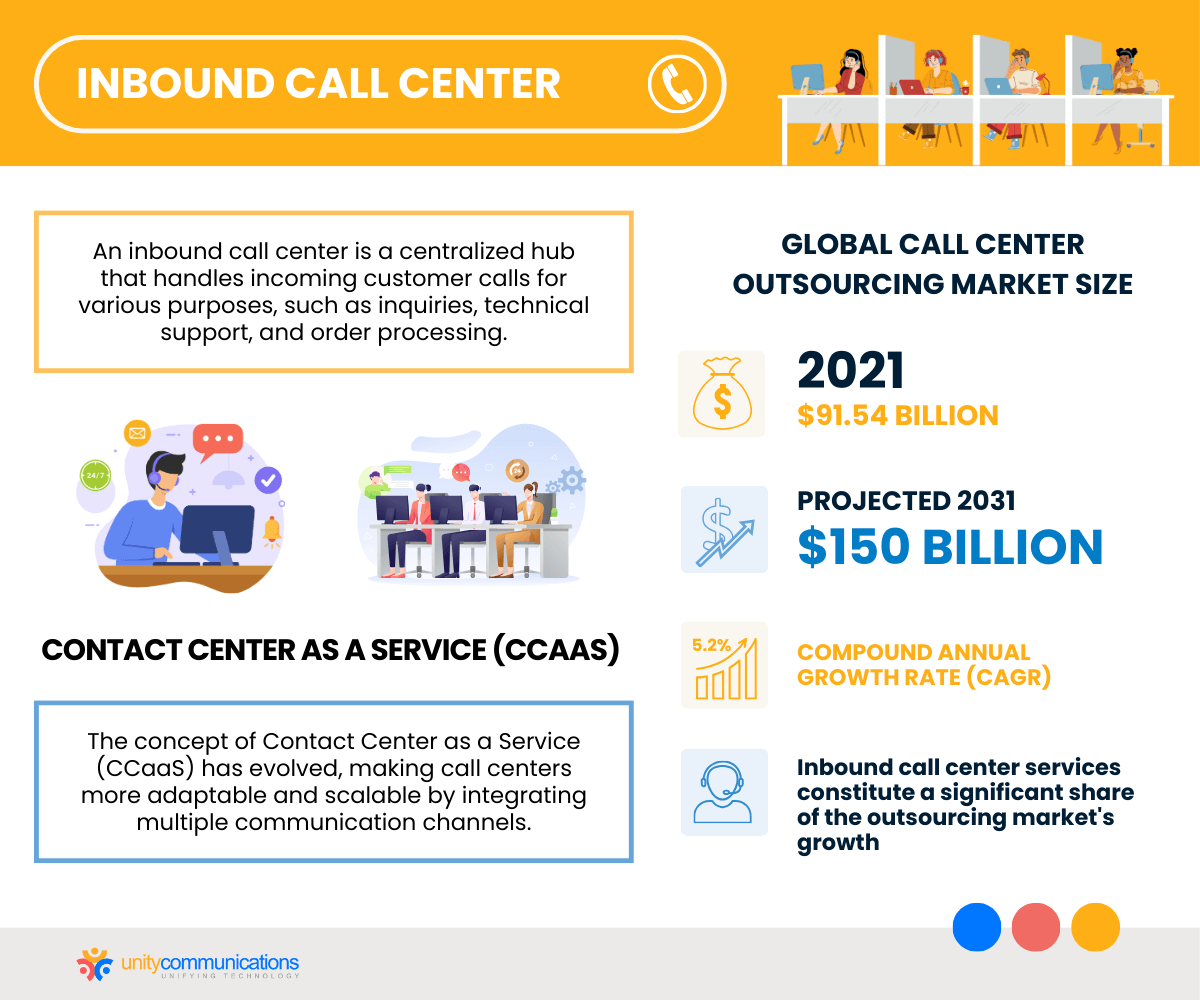IN THIS ARTICLE
Table of Contents
With the advent of contact center as a service (CCaaS) solutions in call centers, businesses are navigating a transformative era in customer service. Thus, understanding what inbound call center service is and how outsourcing supercharges this process becomes pivotal for improving competitiveness.
This article explores outsourcing inbound call center service as an ideal business strategy, including its functions, benefits, and challenges. It also discusses the industry’s future and gives tips for finding a suitable service provider for this operation.
Keep reading to discover more.
What is an inbound call center?

An inbound call center receives incoming customer calls with ease. These inbound contact centers handle everything from support services and order processing to inbound sales, making sure every interaction contributes to a positive customer experience. With skilled call center agents and smart call routing, companies can resolve issues quickly while keeping center performance on point.
The CCaaS model has gained traction over the years. This concept refers to making traditional call centers more adaptable and scalable. The history of CCaaS details the shift from conventional telephone-based communication to a complex system that integrates many customer communication channels for a seamless experience.
Following the evolution of customer communication, an outsourced inbound call center leverages the traditional and CCaaS models for adaptable and unified interactions.
What is an outsourced inbound customer service?
Outsourcing inbound call center services involves contracting with a business process outsourcing (BPO) provider to handle incoming calls and communications. The client company delegates these responsibilities to an external partner, rather than managing customer inquiries, support, and related activities in-house.
So, what is the BPO provider’s contribution when managing inbound call center services? The third-party company employs customer service representatives and specialists skilled in handling all interactions. It also provides the relevant technological and non-human resources to support its personnel.
Outsourcing call centers is a popular approach, indicating its effectiveness. Reports predict that the global call center outsourcing market can reach $150 billion by 2031, up from $91.54 billion in 2021, at a CAGR of 5.2% during the forecast period. Call centers that provide inbound services account for a significant share of this booming market.
With a robust team, advanced resources, and a growing industry, the BPO provider’s contribution seamlessly extends to the diverse functions of inbound contact centers.
What are the functions of an inbound contact center solution provider?

An inbound call center handles customer support, order processing, technical support, and information dissemination, offering multichannel features and virtual contact centers. Here are the details.
- Customer support. Inbound contact centers deal with customer service, addressing questions and concerns, and providing assistance. Trained agents handle a diverse range of issues, ensuring customers receive prompt and helpful responses.
- Order processing. A critical function of an inbound call center is handling customer orders, managing inventory, and facilitating smooth transactions, all of which contribute to a positive customer experience.
- Technical support. Inbound call center agents manage tech support with teams that can troubleshoot problems, walk customers through solutions, and guarantee the uninterrupted use of products or services.
- Information dissemination. An inbound call center might share crucial information about products, services, promotions, and company policies. Timely and relevant updates make customers better informed, which in turn contributes to their satisfaction and loyalty.
- Multichannel features. Modern inbound call agents offer more than traditional phone support. Multichannel capabilities extend to email, social media, live chat, and messaging, allowing businesses to connect with customers through their preferred channels.
- Virtual contact centers. Virtual contact centers have revolutionized how inbound services operate. Agents can work remotely, providing flexibility and enabling businesses to tap into a global talent pool while maintaining operational efficiency.
What are the benefits of outsourced inbound call center services?
Inbound call centers can help create cost-efficient operations, scalable processes, increased focus on core activities, enhanced efficiency, and 24/7 availability. Let us explore the benefits of inbound models further.
- Cost-efficient services. Outsourcing customer support to inbound call centers is more cost-effective than maintaining an in-house team. You need an inbound team to reduce overhead costs, including salaries, infrastructure, and technology investments.
- Scalable processes. They offer flexibility to meet fluctuating call volumes. It makes sense for companies to work with an inbound customer care center if they experience seasonal variations or rapid growth.
- More attention to core competencies. Businesses can channel their focus and resources toward core activities by outsourcing customer support functions. Primary initiatives include product development and innovation, marketing, and strategic planning.
- Enhanced efficiency. Inbound call centers can handle calls more efficiently by leveraging advanced technologies and skilled personnel. This approach leads to quicker issue resolution and improved overall customer satisfaction.
- 24/7 availability. Many inbound call centers, including nearshore and offshore BPO call centers, operate around the clock, providing 24/7 support. This accessibility ensures that customers in different time zones or with varying schedules receive assistance whenever they need it.
- Elevated customer satisfaction. Offshore outsourcing companies offering inbound services can take positive customer experiences to the next level. By promptly addressing customer inquiries and concerns, businesses can enhance customer satisfaction and increase loyalty and positive word-of-mouth.
- Deep market insights. Call centers provide essential customer feedback, offering valuable insights into market trends, preferences, and areas for improvement. You may use call center market insights to inform the development of products, services, and overall business strategies.
What are the challenges of outsourcing inbound call center solutions?

Among the challenges of outsourcing inbound contact center services are quality control, data security, employee training and retention, and multichannel integration. Let us discuss the particulars and recommendations below.
- Quality control. Maintaining consistent service quality across diverse customer interactions can be challenging. Inconsistent service levels might lead to customer dissatisfaction.
Suggested action: Collaborate with the BPO partner to implement robust monitoring systems, ongoing training programs, and regular performance evaluations to consistently deliver high-quality customer interactions.
- Data security. Handling sensitive customer information requires stringent data security measures. Inbound contact centers must invest in robust security protocols to protect customer data from breaches.
Suggested action: Collaborate with the service provider to implement robust encryption protocols, conduct regular security audits, and establish stringent access controls to ensure compliance with industry regulations. Frequently update and educate staff on security measures.
- Employee training and retention. The continuous training and retention of skilled personnel are essential for maintaining a high standard of service. High employee turnover rates can impact the quality of customer support.
Suggested action: Coordinate with the third-party vendor to prioritize ongoing training programs, offer competitive benefits, and promote a positive work culture to enhance job satisfaction and reduce turnover rates.
- Multichannel integration. Seamlessly integrating and managing various communication channels can be a complex task. Inbound customer assistance centers must focus on technology that efficiently handles emails, live chat, social media interactions, and other communication channels.
Suggested action: Invest in advanced technology that seamlessly manages multiple communication channels, ensuring efficient handling of varied customer contacts.
What is the difference between an inbound and an outbound call center?
When comparing an inbound support center vs. outbound operations, the key distinction is who starts the conversation and for what purpose. Inbound calling focuses on responding to customer needs, while sales, outreach, and market expansion goals power outbound activities.
Understanding the differences between inbound and outbound models enables businesses to select the most suitable contact center approach to support growth and enhance the customer experience.
Key differences: inbound vs outbound call center
What’s the difference between inbound call centers vs. outbound? Here are the most common differences between inbound call centers and outbound models.
Call direction
Primary goals
Agent skill sets
Technology and tools
Call center metrics
What is the future of outsourced inbound call centers?
Continued innovation and adaptation to emerging trends will define the future of inbound contact centers. These trends include the integration of artificial intelligence (AI), data analytics for personalization, an emphasis on customer experience, the rise of cloud-based solutions, and enhanced security measures. Let us review each one.
- AI integration. Integrating AI in call centers, including chatbots and non-human virtual assistants, can enhance efficiency and automate routine tasks. This capability allows live agents to focus on more complex customer interactions.
- Data analytics for personalization. Call centers will increasingly leverage data analytics to individualize customer interactions. Understanding customer preferences and behaviors enables the development of tailored solutions and recommendations.
- Emphasis on customer experience. Providing exceptional customer experiences will remain a driving force. Inbound centers will prioritize strategies that boost customer satisfaction and retention.
- Rise of cloud-based solutions. Cloud-based platforms will become more prevalent, offering scalability, flexibility, and quick integration of multichannel capabilities. This prediction aligns with the virtualization of contact centers, allowing agents to work from anywhere.
- Enhanced security measures. Given the increasing concerns about security breaches in BPO, inbound support centers will invest heavily in cutting-edge security solutions to protect customer information and build trust.
How to find the right inbound call center service provider

Selecting a suitable BPO organization is a critical decision that impacts the overall success of the outsourcing engagement. What are the key factors to consider when choosing the right call center?
- Industry expertise. Look for a service provider with experience in your industry. Understanding the nuances of your business is crucial for delivering practical customer support.
- Technology infrastructure. Assess the provider’s technological capabilities, including AI, multichannel integration, and virtual contact center solutions. Ensure their infrastructure aligns with your business needs.
- Scalability. Select a provider that can quickly scale operations up or down to meet your business needs. Inbound centers help companies to increase their capacity, accommodating growth and seasonal fluctuations.
- Quality assurance measures. Inquire about the provider’s quality assurance processes, including monitoring and training programs, to ensure consistent service quality.
- Data security protocols. Ensure the provider has robust data security procedures. Compliance with industry regulations and a commitment to safeguarding customer data are non-negotiable.
- Cost structure and transparency. Understand the vendor’s BPO billing and pricing structures to ensure cost transparency and clarity. Hidden fees can lead to unexpected financial burdens.
- Client references and reviews. Seek and read reviews to gauge the provider’s reputation. Direct feedback from other businesses can provide valuable insights into the provider’s performance.
- Compliance with regulations. Choose the right inbound call center that complies with relevant industry regulations and standards. This is crucial for avoiding legal complications and ensuring ethical business practices.
The bottom line
The evolution of inbound call centers into CCaaS models and outsourcing reflects a dynamic industry. Future trends emphasize the use of AI, personalized experiences, and robust security.
You must carefully select an outsourcing partner based on your specific needs, industry requirements, and the service provider’s reputation. Effective communication and collaboration with the BPO partner ensures a successful and seamless integration of outsourced call centers.
Outsourcing your inbound customer support should be a seamless task. Let us help you utilize outbound customer service to its fullest potential. Let’s connect.
Frequently asked questions (FAQs)
What is an inbound call center and what are the types of inbound services?
An inbound call center handles incoming calls from customers, focusing on support, order taking, billing inquiries, technical help, and other service-related interactions. Types of inbound services include customer service/support, helpdesk/technical support, order management, emergency response, and inbound sales or lead qualification, which together illustrate common examples of inbound call center operations.
How does an inbound call center differ from outbound and when should companies use outbound calling?
An inbound and outbound call centers differ primarily by direction: inbound call centers manage incoming customer-initiated calls, while outbound call centers proactively place calls for sales, surveys, or collections. Businesses should consider inbound or outbound call center strategies depending on their goals. Use outbound calling for lead generation and campaigns, and rely on inbound for support and retention. However, many organizations operate hybrid inbound and outbound calling teams, making sense for companies to increase revenue and customer satisfaction.
How do I choose the right inbound call center solution and what are practical examples to help decide?
To choose the right inbound call center solution, evaluate volume, channel mix, reporting, integration with CRM, staffing models, and SLAs. Examples of inbound call center setups include single-channel phone support centers, multi-channel contact centers integrating email and chat, and specialized centers for technical support or emergency response—consider whether a center to make scalable hiring easier, use outbound capabilities for cross-sell opportunities, or select a platform that can handle calls such as call routing, IVR, and workforce management to fit your business needs.





